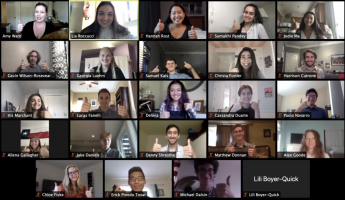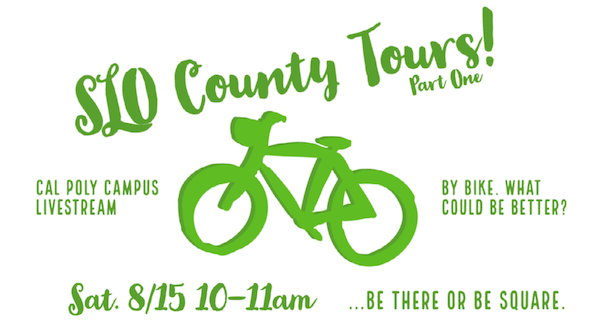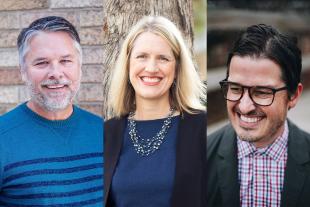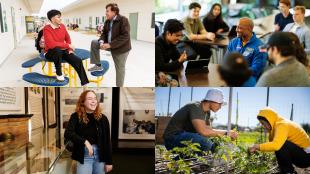Speeches with Horses and Taste-Testing Burritos: How Quarter Plus Program Helped Students Get Ahead Even in a Pandemic

Since 2014, Cal Poly Extended Education has offered the Quarter Plus program to incoming first-year Cal Poly students. The program allows for students to accelerate their academic studies and begin their college experience in the early fall. The four-week program includes eight units of academic coursework, as well as mentoring and encouragement from trained student learning assistants and Cal Poly faculty and staff members.
As Cal Poly moved to virtual operations due to the COVID-19 pandemic in 2020, Quarter Plus pivoted to a virtual program as well. Thanks to the work and preparation of the learning assistants, faculty and staff, the virtual Quarter Plus program ran Aug. 14 through Sept. 8, setting a record with 280 students, a 23% increase from the previous high. The cohort thrived academically, earning an average cumulative 3.53 GPA.
“I absolutely loved my classes and my professors, and I learned a lot of valuable skills and a lot about myself in the process," said Jennifer Zielke, a first-year nutrition major from Atascadero, California. “This quarter, the time-management skills and study habits that I learned in Quarter Plus came in handy.”

“The Quarter Plus program showed me the type of work and assessments that college-level courses had to offer and how much work professors put into grading and supporting me,” said Zachary Felix, a statistics major from Galt, California. “It also helped me get a feel for how much time I would be spending on schoolwork versus how much free time I would have compared to high school.
“I think it is really advantageous for incoming freshmen to participate in Quarter Plus,” he added.
Dianna Previs, director of programming in Extended Education, said, “In the days leading up to the program, we didn’t really know how the program would turn out since it was so new to all of us. Overall, we are really proud of our students and learning assistants for making the program a success.
“As bridge programs from high school to higher education become more and more popular, it’s good to see how to make adjustments to a virtual format and see what we can improve on,” she added.
Amoreena Adams, a first-year biology major from Lancaster, California, said, “I chose to participate in Quarter Plus so I could get a head start in my college career, and I am grateful to have had the opportunity to meet my fellow students and get an introduction on how college would go. Having my learning assistants and instructors available through study sessions, Slack software, and office hours was really helpful.”
The virtual format gave students an opportunity to get creative with their classwork as well.

“One student in our public speaking course gave a speech with her horse in the field at her home, and another gave one where he tasted different breakfast burritos from around his hometown,” said Andrew Litto, a learning assistant and environmental earth and soil sciences major from Las Vegas. “It was great to see them get creative!”
One of the main responsibilities of the learning assistants was to attend classes with the Quarter Plus students and work with the professor to plan and host study sessions to give the students opportunities to work together on class assignments and review content.
“I loved when I would host a study session and students would come for one-on-one help,” Litto said. “It felt like I was really making a difference and helping someone.”
Lia Roccucci, a learning assistant and second-year chemistry major from Sacramento, added, “The study sessions were great not only for helping students with their classes, but also for giving them more of a chance to get to know each other. I feel really lucky that I had a group of students meeting regularly who became close with each other!”
Brooke Bollengier, a learning assistant and second-year biochemistry major from El Dorado Hills, California, said, “The study sessions were a true highlight for me. Students would consistently attend, and we all got to know each other and get comfortable with each other — it felt like we were one big family.
“Now I’ll be on campus and see my students in person and see that they’re still spending time with each other.”
To create a sense of community for the Quarter Plus students and replicate some of the activities that would take place outside of classes in typical Quarter Plus programs, the learning assistants developed dozens of virtual programs and events to engage with students. These events included virtual tours of campus and San Luis Obispo County, virtual cooking tutorials, Jeopardy games featuring Cal Poly trivia and virtual yoga sessions.
“We all did a lot of research and brainstorming in the spring on what activities we could offer virtually,” said Katie Hollister, a third-year graphic communication and English major and one of the lead learning assistants for the Quarter Plus program. “Throughout this whole process, I think we learned that with the right team and the right attitude, virtual work can still be meaningful.
“We had a great team working on this program,” she continued. “We missed the traditional location and physicality of the program’s events, but this year we got to focus more on relationships with individual students. Learning assistants and students still developed great connections over Zoom.”
Ryan Alaniz, associate professor of sociology who has taught with the Quarter Plus program for the last five years, added, “Quarter Plus is all about building community and giving our incoming students the opportunity to be introduced to the university and to instructors and fellow students who can serve as mentors to them.”
In 2020, Alaniz took on an expanded role serving as the program’s faculty learning assistant coordinator, assisting with learning assistants’ training and acting as a liaison between the students, faculty members and program staff.

“The learning assistants did a great job of supporting the students in activities and their study sessions, and now these students have friends who want them to be successful and someone to reach out to,” added Alaniz.
Learning Assistant Bollengier added, “It was sad to have the program end, and I miss my students so much. Our group really made a connection, and I’m so glad they all have these friendships to start their college experience.”
Watch the Quarter Plus learning assistants' closing messages to their students.




